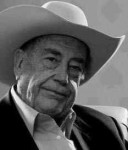
Note: Not at the old Poker1 site. A version of this entry was first published in the London Telegraph in 2005.
Historical note: The following explanatory note didn’t appear in the series, but was sent with each column as submitted.
Doyle “Texas Dolly” Brunson stands unchallenged as the most celebrated poker player who ever lived. In 2005, at age 72, he won an unprecedented 10th championship gold bracelet at the World Series of Poker. He is among the few living members of the Poker Hall of Fame, and his books are the bibles for poker professionals.. Through www.poker1.com and www.doylesroom.com, Brunson has teamed with Mike Caro, today’s premiere poker educator, to offer a free learning experience to players worldwide. This column is founded on those collaborative teachings.

I’ve always been a believer in attitude. If a man thinks he’ll win a poker, then he’s more likely to prevail. Confidence won’t make you any luckier, but it can make you play better. Assuming you have enough skill to win, confidence will keep you from turning against yourself and letting self-doubt and panic prompt you to make poor decisions.
I guess my ultimate recollection in this regard happened years ago when a young man came to Las Vegas and conquered the seven-card stud games. His name was Keith. And I’m here to tell you, Keith just couldn’t lose. He destroyed those games. You knew from the moment he strode into the poker room that he expected to win. He acted as if it was his destiny to win.
I befriended Keith briefly. Beyond just being confident, he had a keen interest in learning the best tactics and would ask me for advice. He confided that he always psyched himself up before games. In fact, he told me that he used mental tricks to get himself into the “perfect winning mood.”
A trance
Once I found him in the men’s room minutes before the first deal, gazing into the mirror and saying, “I will win!” He repeated it over and over. Then he concluded solemnly, “Keith, you cannot lose.” And he left for the game in what appeared to me to be almost a trance of invincibility.
And, of course, he won.
He even convinced me to try a few of his experiments in self-confidence, such as imagining myself with all the chips piled in front of me. It seemed to work. As I’ve said, a player with confidence has a long-term advantage over one without it. There’s nothing supernatural about that, either. It’s simply that confidence is a psychological force that keeps you on target and unnerves your opponents.
Then Keith’s behavior tilted toward bizarre. He once rose from his seat across from me in a restaurant and shouted, “Win! Win! Win!” After that, I never socialized with him. His mind was clearly cracking. Everyone could tell.
Play even better
Then he decided that he’d play even better if he could convince himself he was losing a little in the beginning of a session. That way, he figured, he’d have to be even more dedicated to win his way back to even. Even that mental trick seemed to work for him — for a while.
Then, one day, he tried his biggest psychological gambit ever. He spent hours making himself believe that he was an enormous $100,000 behind in a $300-limit game. Clearly he had bought into his own fantasy, because when he won the first pot and was ahead $2,000, in his mind he was still $98,000 loser and he still appeared desperate. That’s when he crumbled like sod squeezed through your fingers during a drought. In less than two days, he unloaded his bankroll. All gone.
I suppose playing mind games can be helpful or harmful, depending on how you use them. Personally, I stick to the simple stuff and leave elaborate mental experiments to more the more adventurous – like Keith. Poker players should have faith in their own abilities. That helps. And that’s as far as I take it. — DB
